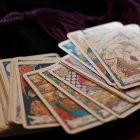Good Bad Women: The Sea Witch

A band, made up of eight young Swedes playing steel drums, had set up just outside the bookshop where I work. I didn’t step out of the shop to watch them until, almost without realizing it, I was singing along, “Under the sea, under the sea, darling it’s better down where it’s wetter under the sea…” It’s one of those songs I didn’t know that I knew until I’m standing in a circle with two dozen strangers singing it like I’m ten years old longing for freedom and adulthood, just like Ariel.
As you probably recall, the little mermaid strikes a deal with an evil sea witch, where, in exchange for her voice, the sea witch gives the little mermaid legs. What you may not know is that in the original version, written by Hans Christian Anderson, the sea witch warns the Little Mermaid against her wish:
It is very foolish of you, but just the same you shall have your way, for it will bring you to grief, my proud princess. […] Every step you take will feel as if you were treading upon knife blades so sharp that blood must flow. I am willing to help you, but are you willing to suffer all this?
The sea witch has expertise, sexuality, and independence—which is precisely what makes her so dangerous. Unlike the heroine, who is only fifteen and still a child in many ways, the sea witch is a fully empowered free woman who warns the Little Mermaid that fulfilling her wish will lead to her own demise. Though those same words spoken by a male character to another male character would likely be characterized as a mentor’s advice to a mentee, in this case they are meant to illustrate sea witch’s own nefariousness. Ursula’s knowledge and power is dangerous because she is unmarried and unchecked, by either a husband or a father. In contrast, the sea king’s moral goodness is enhanced by the absence of a wife, while the sea witches moral corruption is underlined by the absence of a husband. The sea witch is the villain because she is feminine but not maternal, mature but not matronly. The sea witch is also motivated by a quest for power, rather than for a male character’s attention, which puts her in a very small cohort of female villains, alongside Cruella de Vil.
But, as a ten year old my allegiances were with little mermaid. She was pretty, in love, silent, and suffering. It turns out that silence and suffering are key attributes not just for the little mermaid, but for many female characters in folktales and children’s stories. Culture critic Marian Warner argues that silencing of female characters, either through muteness, death, or 100-year long naps is actually what makes these characters so morally unimpeachable and may be part of the reason why there are so many highly virtuous and completely dead mothers in fiction. In fiction virtuous women are silent or silenced—it is dangerous women that speak up.
If you really think about it, if you really look at the story either as told by Disney or by Hans Christian Anderson, the Little Mermaid gets her freedom, transitions from childhood to adulthood, only to be silenced in a more profound way. In one version the little mermaid meets her death, in the other she looses her precociousness. Why are so many of our heroines so boring, and why are self-reliant women only written villains?
I close up the bookshop and walk home, still humming the melody of “Under the Sea.” As a child I wished I was the little mermaid, but now, I’m pretty sure, sea witches have more fun.



